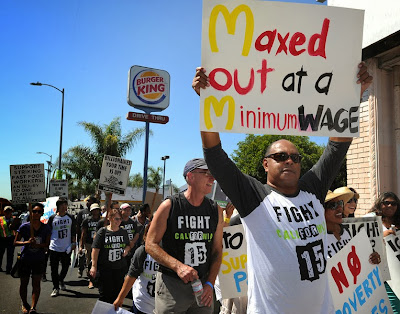Minimum wage increases force businesses to employ fewer workers. They can't afford to pay more than what the employee can provide in value to the business. If the worker brings in $10 per hour to the business, they will be fired if the minimum wage goes over that amount. It is not sustainable to run a business that pays workers more than their contribution to the company.
An increase in the minimum wage cuts low-skilled workers out of the market. It prevents the young, uneducated, or inexperienced from getting a job. This contributes to unemployment and someone has to support these people. Supporting them may stretch the family budget but more likely, these people put their hands out and ask the government to give them money.
The funny thing is, the government has to get money from somewhere. They could borrow or print money which hurts the economy. A more likely option though is to take from the productive people in society through taxes. People who work are forced to give a portion of their income to those who are not providing anything for society. As the minimum wage raises, to pay for the workers cut out of the labor market, governments have to raise taxes or take resources away from other areas.
When the minimum wage increases and businesses are forced to pay employees more, they must somehow cover the increased cost. One method this is accomplished is by increasing the prices of their products. This is felt by all customers and they then need to earn more at their jobs to pay for the increasing costs. This causes an unending cycle and inflation is the result. Inflation steals from people who save. Their money becomes worth less and less over time.
When business margins are small, minimum wage increases can lead to businesses closing down. Your favorite shop or restaurant may be the next one to fall. This is a problem even if you prefer the business that remained open. As the number of businesses decrease, shops can cut corners and buy lower quality products which hurts the customer. Competition in the market is what keeps quality standards high. A higher minimum wage hurts the economy, causes unemployment, and reduces the quality of the products you buy.

The House of Representatives knows this, and will not raise the minimum wage.
ReplyDeleteLike the Occupy Wall Street protest, the risk is in changing popular opinion and gaining sympathy with the mainstream media. Politicians will then use popular opinion to make decisions about their votes in elective office to ensure reelection. We must not always focus on the present, but of the future repercussions of our collective actions. The young people who are now forming their economic ideals will one day become the politicians. The best way to battle incorrect thinking is to educate people.
Delete